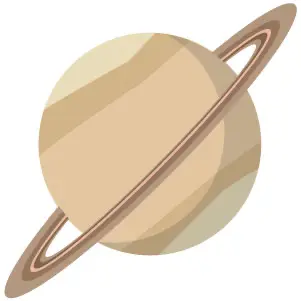Saturn is the furthest planet from the Sun that we can observe with a naked eye. This gas giant is famous for his rings, which can be even seen with the help of a small telescope. He is named after the Roman God Saturn, equivalent to the Greek Cronus, father of Zeus. Astrologically, he is ruling restriction, thus becoming feared by many people. Indeed, his placements and influences can bring difficulties to the everyday reality of a person; yet, he is also a great teacher passing wisdom. Saturn is ruling responsibility and seriousness, obligation and dedication.
Saturn: The Planet of Karma
Saturn is often regarded as the taskmaster of the zodiac, and it doesn’t make things easy for us. This planet commands us to work hard and take responsibility for our actions. Discipline and diligence are crucial to Saturn’s influence, but it also encourages ambition and the desire to achieve great things. Symbolized by the sickle of Chronos, the God of Time, Saturn urges us to consider the limitations of time. It teaches us to manage restrictions and delays in our lives. Saturn governs the concept of old age and the valuable lessons it imparts. Learning from life’s experiences is a significant aspect of this planet, which plays the role of a wise teacher.
With age, Saturn bestows a sense of tradition, conventionality, and wisdom. It appreciates our perseverance and the ability to withstand the test of time. The authority that comes with seniority is also within Saturn’s domain. Saturn is associated with structure, order, and how we organize our affairs. It emphasizes the need for prudence and the restraint of resources. As a teacher, Saturn focuses on karma and the lessons that can be learned from past experiences. Saturn’s orbit takes about 28-30 years to complete, making its transits significant turning points in our lives. It possesses masculine energy and rules both Capricorn and Aquarius, influencing the Tenth and Eleventh Houses in the birth chart.
Moreover, he offers us a harvest of results through patience. One must dedicate a lot of time and effort to activate his Saturn; on the other hand, the planet’s gifts are long-lasting. He rules the old age, our grandparents and the elders in general. In addition, he is considered to be strongly connected to one’s Karma, and his natal condition indicates karmic debts we might pay from previous lives. Saturn rules the sign of Capricorn, and also is the older ruler of Aquarius. Since the discovery of Uranus, Saturn has remained the co-ruler of the sign.
In addition, Saturn is responsible for the 10th house and makes a full circle around the zodiac in approximately 29 years. He spends about 2,5 years in each sign and gets into a retrograde movement for approximately 5 months every year. A full cycle around a natal chart signifies the passage towards a more mature period. Indeed, the 29th and the 58th year of our life are the rough barriers between being young, an adult and an elder. Saturn is exalted when in the sign of Libra, in fall and weak when in Aries, while operates with difficulty in Cancer where he is in detriment.
Saturn is the last planet visible to the naked eye in our Solar system. Beyond its orbit, the celestial bodies become hazy and are only visible under specific conditions, which is why the more distant planets were not discovered and recognized as planets until much later in history. Saturn is renowned for its spectacular rings, which are composed of ice and dust particles. Although it is not classified as an “ice giant” like Uranus and Neptune, the abundance of ice around Saturn characterizes its role in the zodiac. The rings themselves are thin and wide, contributing to the planet’s unique appearance. Interestingly, Saturn’s entire surface is known for being the flattest among all planetary surfaces.
Saturn In Astrology

Saturn, as the visible boundary of our solar system to the outer universe, symbolizes boundaries on a personal level as well. When positioned in challenging aspects, Saturn represents our struggles to defend ourselves and set healthy boundaries with the outside world, other people, and difficult circumstances. It acts as a restriction, guiding us towards our true path, even if we may not immediately see its benefits. The clarity of faith required to embrace Saturn’s highest form seems almost unattainable, as it demands acceptance of all hardships and obstacles as our personal responsibility.
The sense of responsibility associated with Saturn often leads to feelings of inadequacy and guilt. The demands it places on the planets, houses, and signs it interacts with can be burdensome and challenging. Saturn represents the societal boundaries imposed on our personal world, and we can only flourish within this system if it genuinely supports us. Embracing schedules, planning, and hard work is essential when dealing with Saturn’s energy. Running away from its obligations is not an option; instead, we must face them head-on, accept the challenges, and hope for the best while being attuned to the signals the universe sends our way.
Saturn rules over time and order, symbolizing the concept of time itself, whether in the form of a grandfather’s watch or the ability to do things meticulously and timely. It emphasizes slow, steady progress, even if it means dealing with unfinished or broken aspects of life. Saturn embodies the image of an old man in the shadows, representing wisdom, solitude, and poverty. Although it primarily relates to career, status, and progress through careful planning, its main purpose in our lives is to remind us to rest.
Rest and relaxation are crucial for dealing with Saturn’s challenges, as overworking and taking on excessive responsibilities can lead to physical and mental strain. If we ignore our limits and boundaries, Saturn may force us to rest by causing illness or other forms of physical breakage. Saturn operates on an unconscious level, teaching us to recognize and respect our own potential, abilities, and basic physical needs.
Thus, any problems that can occur in our lives during those periods are observed through an altered perception of time; moments seem like hours and hours like days. When Saturn has a lesson to give us, it is very important to be serious. When we cooperate with the ringed planet instead of opposing it, he tends to push us rather than to slap us. The transits of Saturn can last up to a year, and require organization and effort from us. The sooner we join forces with him, the sooner we will resolve any troubles and emerge wiser. Saturn rules everything that is stable and all activities that include organization of smaller particles in order to form a big one. The planet is the great architect, who slowly but steadily will build a powerful fortress.
Indeed, masonry and building are strongly connected to the planet’s realm. In addition, even our bones and teeth (since they are the hardest and steadiest parts of our body) have Saturn as their governor. He is the master of winter since the humankind experiences the coldest weather during his days (the “Capricorn season”, from mid-December to mid-January); especially if we consider his older rulership of Aquarius too (from mid-January to mid-February). Saturn is considered to be the last of the personal planets, as all the rest that orbit further than him are generational and mostly influence mass currents.
This is mostly due to their slow orbiting pace, but also due to their distance and non-visibility to the human eye. Their influences are affecting deeper layers of the human-kind, while Saturn is the borderline between personal and collective unconscious. Of course, as every planet, Saturn also has its dark sides. Some of them include totally merciless behaviors that can reach cruelty. It is no coincidence that the planet and his sign Capricorn are mostly responsible with the Christian archetype of the devil. It can bring hard labor without gains, suffering and melancholy.
Other things connected with the planet are emotional distance, denial, and depression. In addition, the ancient Greek archetype of Pan has also a lot of ties with the planet and the sign. Pan, the goat-like forest god represents the raw forces of nature, which can even work under very cruel laws. It takes to be strong to survive the difficulties that life brings, both on a physical and a symbolical level. Being a governor of this earth sign, Saturn partially rules agriculture and other activities connected with ground and patience.
This once again shows us that a Saturnian persistence can, in the end, bring a good harvest as a result. Due to his connection with the 10th house, the planet governs career and authority positions. Saturn shows a slow and gradual growth, through the establishment of a correct system and the implementation of wise tactics. The knowledge that one can obtain through patiently pushing his way up the hierarchical ladder can make him become the wise elder who organizes the others below them. Of course, Saturn can also make someone very despotic when he claims an authority position. It signifies the master who pressures the ones that reside lower in the pyramid of hierarchy.
It is obvious that Saturnian transits are not the easiest periods of a person’s life; we usually must readjust ourselves, even by letting go of things we like and that are a stable part of our reality. Frequent problems that arise are connected with the cold nature of the planet Saturn: there can be a lot of nervousness and lack of joy, hair loss, changes in hair color to white or silver shades and health issues. This painful transition can be surrounded by a lot of stress and hard work, while also frequently involves paying debts; both to people, institutes and of course to ourselves.
As Saturn is a rather slow moving planet, its passage through a sign creates problems to all the people born under it. Of course, each one of them feels that transit in a different house, having different life areas affected. Also, the severity of a Saturn transit largely depends on his natal aspects, and also on the natal aspects of the planets he is in conjunction with by transit. As a planetary force, Saturn requires from us to grow up. Whoever is more receptive to the planet’s energy will eventually have a more harmonious passage towards the next age category.
Those who tune in with its powers will be offered his gifts, which can bring success in their elder age. Every individual should research his natal Saturn placement in order to understand its functions better. Many times, Saturn is operating as a “malefic” because human beings tend to yearn for easy gain without a lot of effort. Thus, the house where it is natally located should be examined better, so that we see which sections need to be empowered, while also possible karmic dues that need to be paid first.
Find in which house your Saturn is located in your natal chart, and read the respective article to uncover more about its functions:
Saturn 1st house | Saturn 2nd house | Saturn 3rd house | Saturn 4th house | Saturn 5th house | Saturn 6th house | Saturn 7th house | Saturn 8th house | Saturn 9th house | Saturn 10th house | Saturn 11th house | Saturn 12th house |
Each planets have a different effect on you, depending on which house and sign they reside in. In order to find out where they are located in your natal chart, you can use our free birth chart generator. Also, examine the aspects that they form with other planets in your chart. You will understand a lot more about the detailed role that they have in your horoscope.
